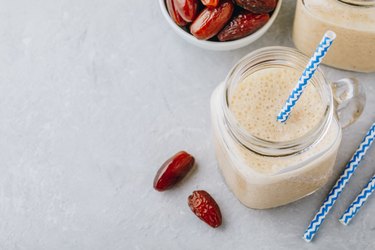
Protein shakes support muscle growth and repair after exercise and they can be a quick meal replacement when you're on the go. Drinking two protein shakes instead of full meals daily may help you lose weight, but it isn't really a long-term weight management solution.
Do you want to lose weight or be healthier? Join MyPlate Calorie Counter and get access to free meal plans, healthy recipes and at-home workouts. You'll also get daily calorie and macro goals for your fitness journey. Don't miss your chance for amazing results. Sign up today!
Video of the Day
These shakes make it easy to cut calories, but at some point, you'll return to whole foods and won't have learned a sensible way to eat. Even if you do decide this is your ticket to weight loss, carefully choose the shakes you consume and consider whether they're the best options for your health goals.
Tip
You can lose weight replacing two meals a day with protein shakes, but it may not help you keep the weight off in the long run.
Potential of Protein Shakes
You can purchase protein shakes from the refrigerator case at your gym or health food store. Alternatively, make your own homemade protein shake by mixing liquid and other ingredients with a powdered protein — either whey, soy or another vegetarian version.
A protein shake usually contains about 20 grams of protein per serving and varies in calories. Avoid shakes marketed to bodybuilders or those with sweeteners and other carbohydrates added; they often have a high calorie content.
A very small study of seven people published in a 2013 issue of the Journal of Chiropractic Medicine found that drinking two protein shakes as meal replacements per day for 21 days led to significant weight loss.
These participants underwent a complete "dietary purification" program, however, in which their food intake was closely monitored and restricted. They were also provided with additional weight-loss supplements at various times during the program.
Protein for Weight Loss
A protein shake may help curb hunger, making a low-calorie diet easier to follow. A study published in the journal Obesity in 2007 showed that a high daily protein intake can help increase your metabolism slightly and decrease your appetite. When dieting, an intake of 30 percent of daily calories from protein seemed to diminish the effects of ghrelin, a hormone that stimulates appetite.
Protein shakes do help contribute to a high daily protein intake, but not any more than protein obtained from whole foods. For example, a 3.5-ounce serving of skinless, light-meat chicken or flank steak provides 25 or 27 grams of protein, respectively, along with additional nutrients.
If you rely on supplements for most of your meals, you miss the valuable components of whole foods, such as phytonutrients, fiber and healthy fats. Protein supplements are best used as an occasional meal replacement when time or logistics doesn't permit whole food. For example, drinking a protein shake may be convenient if it helps prevent a fast food run or candy bar snack.
Protein Shakes With Exercise
Protein shakes prove valuable after a tough strength-training or endurance workout. The International Society of Sports Nutrition (ISSN) notes that heavy exercisers benefit from additional protein, especially around the time of their workout. The ISSN also maintains that the branched-chain amino acids found in whey and casein protein powders may help improve exercise performance and recovery.
Exercise should be part of any healthy lifestyle, especially when you're trying to manage your weight. Strength-training, in particular, helps you maintain lean muscle mass as you lose weight, which keeps your metabolism humming. If you use a protein shake to replace a pre-workout and post-workout meal, you could support the benefits of that workout and recover from it sooner.
Each pre- and post-workout shake should only contain 150 to 200 calories so you don't consume too many calories in addition to your meals. Mix whey protein in water or low-fat milk, or blend a scoop with 1/2 cup of skim milk, a handful of blueberries and ice.
Composition of Protein Shakes
Ready-to-drink protein shakes are sometimes contaminated with heavy metals, according to tests performed by Consumer Reports in 2010. When these shakes are used daily, this contamination could pose a health risk.
Make your own meal-replacement protein shakes so you can tweak the nutritional content and minimize exposure to potential contaminants. Use powdered protein, fresh fruits and vegetables, a teaspoon or two of healthy fat — such as nut butter, coconut oil or flax meal — and milk or water.
Watch the proportion of extra ingredients you add to the shake, though. You can easily raise a shake's calorie count if you add too much banana, peanut butter, honey or juice. You may end up with more calories than you'd have eaten in a nutrient-dense salad containing chicken breast, raw vegetables, a sprinkle of sunflower seeds and olive-oil dressing.
- Body+Soul: Do Protein Shakes Really Help You Lose Weight?
- Journal of Chiropractic Medicine: Changes in Weight Loss and Lipid Profiles After a Dietary Purification Program: A Prospective Case Series
- Consumer Reports: What Our Tests Found
- Journal of the International Society of Sports Nutrition: International Society of Sports Nutrition Position Stand: Protein and Exercise
- Obesity: Effects of Acute and Chronic Protein Intake on Metabolism, Appetite, and Ghrelin During Weight Loss
- Healthaliciousness.com: Chicken, Steak
- Experience Life: Protein Power